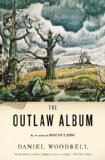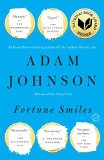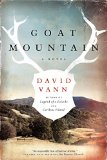Summary | Excerpt | Reading Guide | Reviews | Beyond the book | Read-Alikes | Genres & Themes | Author Bio

Stories
by Daniel WoodrellWriters pegged as "regional" are a lot like character actors: both can become wedged so tightly into one hole they can never be taken seriously elsewhere. Of course, this isn't always a negative. Faulkner is largely considered a regional novelist, a Nobel laureate who created a whole oeuvre built around a mythical world known as Yoknapatawpha, based on the area surrounding his native Oxford, Mississippi. Likewise, most of Daniel Woodrell's stories are set in his native land: the Ozarks, a little Appalachia-esque microcosm plunked down in southeastern Missouri, where the author grew up and chose to stay.
The stories collected in The Outlaw Album are diverse in plot but unified by several themes, the most pervasive being the often twisted nature of family relationships and the horrible aftereffects of war, the indelible stamp it leaves on the psyche of those who've survived it. Woodrell's style is matter-of-fact, almost monotone, magnifying the occasionally gory content in relief against the backwoods of rural Missouri. His stories drip death and sorrow in equal amounts, his characters complex and quirky, some veering into the sociopathic. They are poor, un- or under-educated, often with hair-trigger tempers, deeply feeling, and deeply damaged in one way or another.
"Black Step," perhaps the most complex story in the book, depicts a war veteran who releases the pressure of unrelenting Post-Traumatic Stress Disorder by painting, interpreting how his damaged mind now views the world by creating a nightmarish alternate reality on canvas. As the story begins, Darden Girard - returned from war to live with his terminally ill mother on her farm - discovers, after a violent storm, one of his mother's cows dangling from a tree limb just over a cliff, one leg broken, stuck out at an odd angle:
"The cow had wide screaming eyes that were saying things that living things say to me in that language better than words. That language that travels. I've seen it everywhere."
And he has - from toddling in a diaper up to his dying father just after the man had shot himself, the little boy stepping in the sticky blood, to crawling on his belly in a time of war, hiding behind tombstones searching for an enemy who could be just six feet away, waiting to blow him to kingdom come.
In "Uncle" the topic is sexual abuse and rape; an adolescent girl who watches her uncle rape, time and again, eventually has to care for him as if he were a baby when he gets injured. Until one day, she realizes she can't let this "baby" grow up...
"Two Things" digs into a fraught family situation in which a son, incarcerated for violence and theft, begs his father for help with early parole via a social worker who knocks on his door one day, claiming the boy had changed. He's become a poet, she says. A gifted writer. But his father knows better, slams the door after her, and is left holding the small book of poems she's given him.
In story after story, blood is spilled or threatened, lives are lived despite great sorrow and pain. Children are lost through violence, revenge sought but seldom achieved. A certain cruelty shoots through these tales, evidence of a universe that has turned its head, unable or unwilling to help. Seldom, if ever, is there any sense of relief. Even then it's never enough to compensate for the loss.
But despite the unrelenting brutality of these stories, there are moments of dark humor. In "Uncle" the niece continually puts the man in positions of jeopardy, wheeling him into the river up to his neck, or outside during a fierce lightning storm, tempting fate to take care of things for her. In "The Echo of Neighborly Bones," a man takes out the frustrations of everyday life by continuing to mutilate the corpse of a man he's already murdered, willing to take the risk of being caught in his desire to blame someone, or something, for all the wrongs in his world: "He killed him again whenever he felt unloved or blue or simply had empty hours facing him."
Though it's the sort of humor we almost hate ourselves for laughing at, Woodrell makes it all but impossible not to see the absurdity in the horrific, dubbing his own writing "country noir." His style is singular - grotesque yet beautiful. It's impossible not to be impressed with the depth he achieves in such low-key prose.
Granted, this is not recommended general reading. It's for the sort of person who craves the gothic, the real life horror of such writers as Stephen King, mated with William Faulkner's Snopes clan, tossed with a dash of the worst violence from the daily news. There's no uplift, no sun coming out tomorrow.
This short volume is masterful dark writing at its best, set in a distinct, culturally isolated area, filled with characters no one in his right mind would ever want to know. This is the grotesque told with a sly wink. A true stand-apart story collection by the writer of eight novels, two of which have been adapted to film: Woe to Live On (1987), adapted to Ride With the Devil in 1999, directed by Ang Lee; and Winter's Bone (2006), adapted to film in 2010 and nominated for four Academy Awards.
![]() This review was originally published in The BookBrowse Review in January 2012, and has been updated for the
October 2012 edition.
Click here to go to this issue.
This review was originally published in The BookBrowse Review in January 2012, and has been updated for the
October 2012 edition.
Click here to go to this issue.

If you liked The Outlaw Album, try these:

by Adam Johnson
Published 2016
Winner of the Pulitzer Prize for his acclaimed and bestselling novel The Orphan Master's Son, Adam Johnson is one of America's most provocative and powerful authors. In Fortune Smiles - his first book since Orphan Master - he continues to give voice to characters rarely heard from, while offering something we all seek from fiction: a new way of ...

by David Vann
Published 2014
David Vann creates a haunting and provocative novel that explores our most primal urges and beliefs, the bonds of blood and religion that define and secure us, and the consequences of our actions - what we owe for what we've done.
Your guide toexceptional books
BookBrowse seeks out and recommends the best in contemporary fiction and nonfiction—books that not only engage and entertain but also deepen our understanding of ourselves and the world around us.